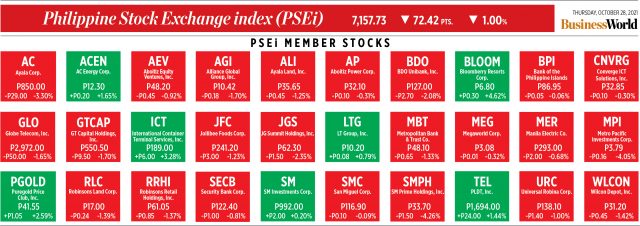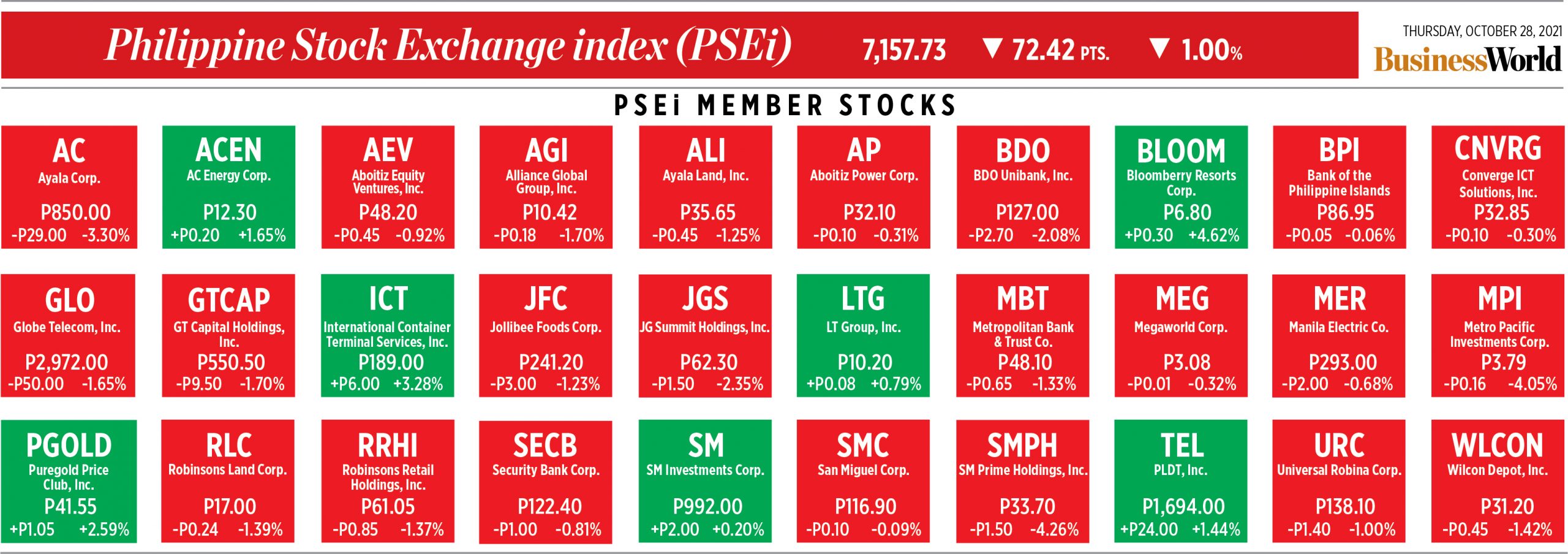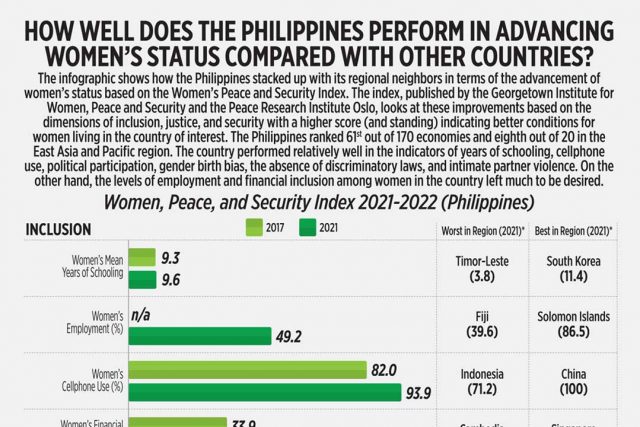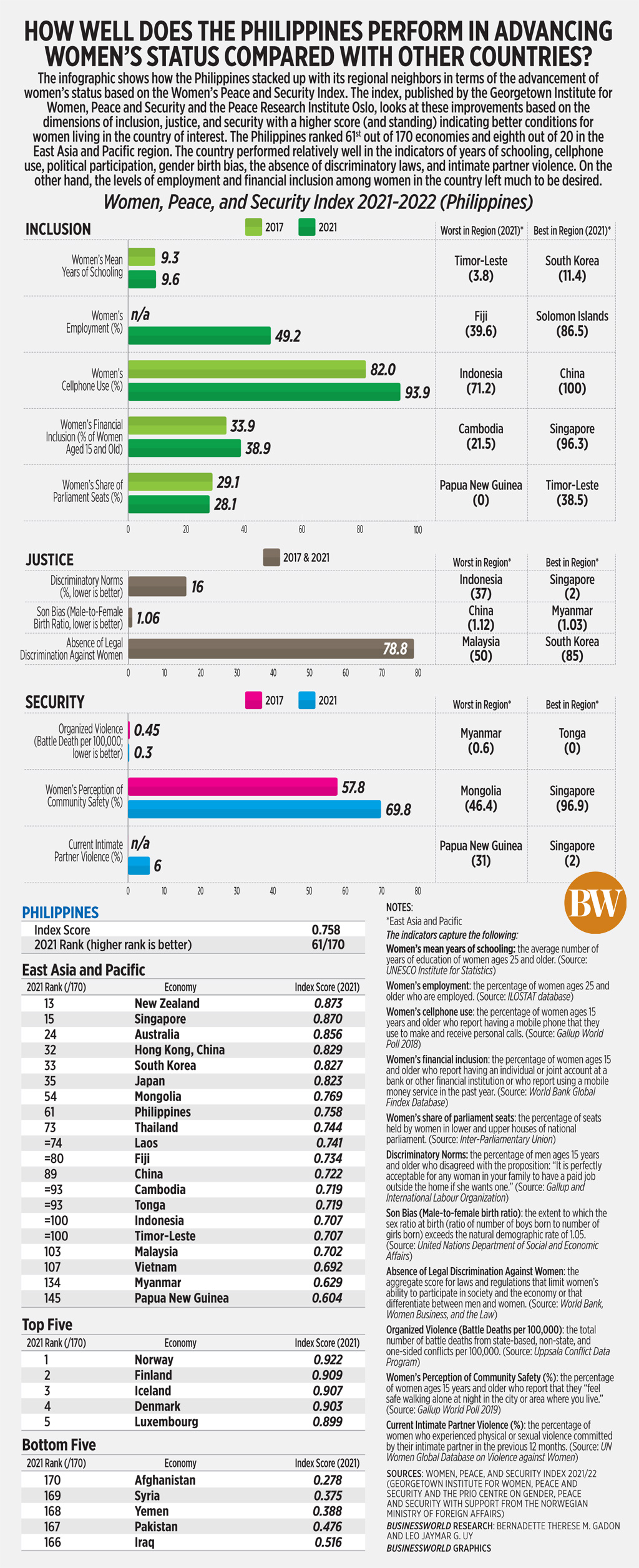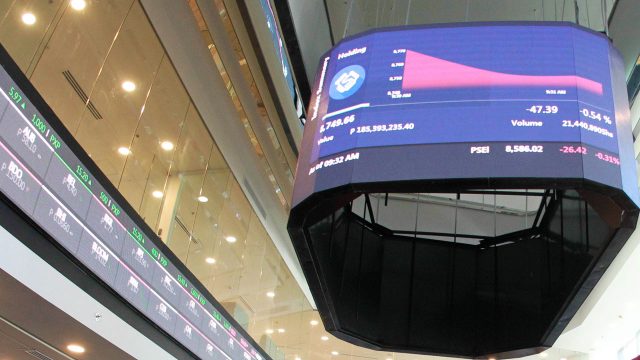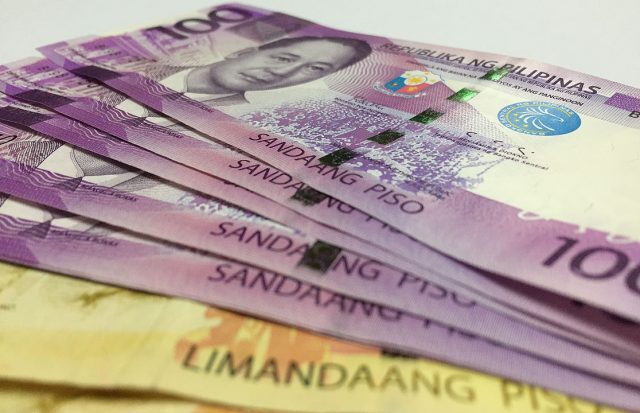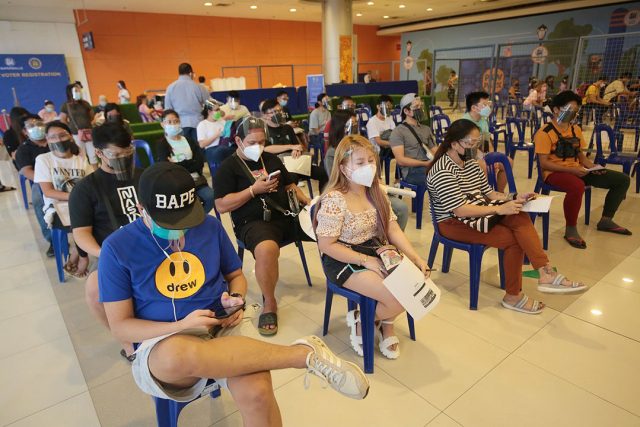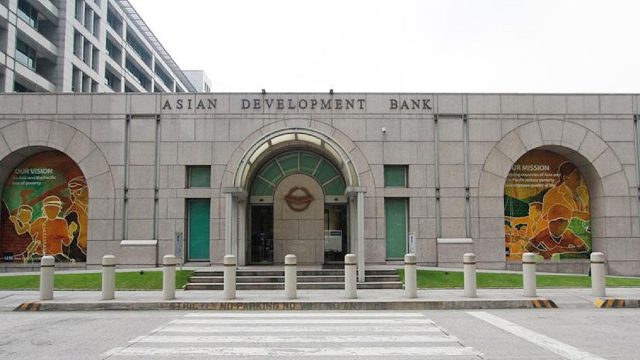Local shares decline further ahead of key data
PHILIPPINE shares declined along with most markets in the region on Thursday as investors await more corporate earnings reports and key data releases, and with coronavirus disease 2019 (COVID-19) cases in neighboring countries starting to rise again.
The Philippine Stock Exchange index (PSEi) dropped by 72.42 points or 1% to close at 7,157.73 on Thursday, while the broader all shares index went down by 32.97 points or 0.74% to 4,420.85.
“Philippine shares took a breather after rallying as investors braced for the release of more [third quarter] earnings, the release of GDP (gross domestic product), and more global inflationary concerns,” Luis A. Limlingan, head of sales at Regina Capital Development Corp., said in a Viber message.
“The market slid together with most markets in the region as investors chose to stay on the sidelines while digesting the reports of a surge in COVID-19 cases in some countries like China and Singapore,” Timson Securities, Inc. Trader Darren Blaine T. Pangan said in a separate Viber message.
Asian stocks fell across the board on Thursday as investors were unsettled by risks of renewed US-China tension, Reuters reported.
Investor focus was squarely on developments in China, which is grappling with an economic slowdown due to an energy crunch and a crisis in its property sector, as well as fresh COVID-19 outbreaks.
Japan’s Nikkei declined 0.96%, China’s Shanghai Composite index went down by one percent, and Hong Kong’s Hang Seng index went down by 0.49% on Thursday.
In China, Ejin county was put on lockdown after a Delta surge, forcing 35,700 residents to stay home to curb the spread of the more transmissible COVID-19 variant. Beijing has banned residents from areas in the country that have reported locally transmitted COVID-19 infections.
Majority of sectoral indices closed in the red except for services, which gained 20.08 points or 1.05% to 1,926.56.
Meanwhile, mining and oil shaved off 372.64 points or 3.55% to 10,104.78; property lost 86.44 points or 2.65% to 3,164.70; holding firms declined by 89.92 points or 1.26% to finish at 7,029.06; financials went down by 16.44 points or 1.04% to 1,550.65; and industrials gave up 68.80 points or 0.62% to 10,876.87.
Value turnover inched down to P7.16 billion with 921.51 million shares switching hands on Thursday from the P7.75 billion with 746.19 million issues traded the previous day.
Decliners outnumbered advancers, 121 against 85, as 41 names closed unchanged.
Foreigners turned sellers, logging P656.64 million in net outflows on Thursday versus the P184.04 million in net purchases recorded on Wednesday.
“[The 6,940-level] remains the support area, while 7,320 seems to be the closest resistance level to watch in the coming days,” Mr. Pangan said. — Keren Concepcion G. Valmonte with Reuters
Peso moves sideways before announcement of new Metro Manila restrictions
THE PESO inched sideways versus the greenback on Thursday, with investors still waiting for the government’s announcement on mobility restrictions for next month and as oil prices dropped.
The local unit closed at P50.71 per dollar on Thursday, inching up from its P50.72 finish on Wednesday.
The peso opened Thursday’s session weaker at P50.77 against the dollar. Its weakest showing was at P50.80, while its intraday best was at P50.70 versus the greenback.
Dollars traded went up to $899.73 million on Thursday from $824.84 million on Wednesday.
The peso moved sideways the market was waiting for the government’s announcement on restriction measures for November, Rizal Commercial Banking Corp. Chief Economist Michael L. Ricafort said in a Viber message.
Metro Manila is under Alert Level 3 until Oct. 31.
The National Economic and Development Authority on Thursday said easing restrictions in the capital to Alert Level 2 could add P3.6 billion to the economy weekly. If the region is placed under Alert Level 1, this could add P10.3 billion, along with 43,000 new jobs.
Meanwhile, a trader said the peso gained versus the dollar on the back of lower global oil prices.
Reuters reported on Thursday that fuel prices dropped to a two-week low as rising infections in major economies dented hopes for economic recovery.
Brent crude declined 94 cents or 1.1% to $83.64 a barrel by 0655 GMT after hitting a two-week low of $82.32 earlier. Meanwhile, US oil inched down 89 cents or 1.1% to $81.77 a barrel — a one-week low after dropping 2.4% on Wednesday.
For Friday, Mr. Ricafort gave a forecast range of P50.63 to P50.78 per dollar, while the trader expects the local unit to move within P50.55 to P50.80. — L.W.T. Noble with Reuters
Metro Manila lockdown may be eased next month
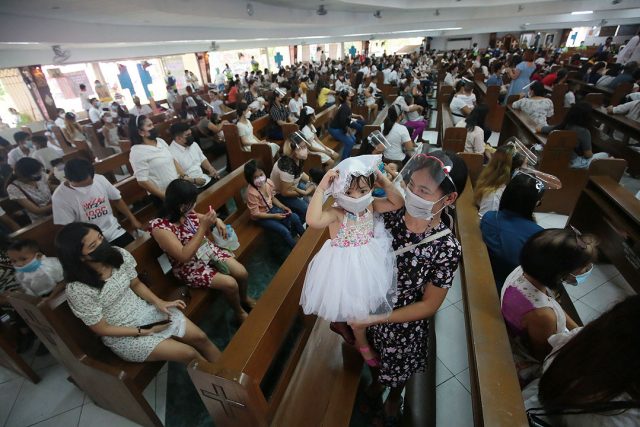
THE LOCKDOWN in Manila, the capital and nearby cities will probably be relaxed next month as coronavirus infections get under control, according to the Interior and Local Government department.
Coronavirus cases in the capital region fell by 48% in the past two weeks, Interior and Local Government Undersecretary Jonathan E. Malaya told the ABS-CBN News. “If this trend continues, we can look at a lowering of the alert level soon.”
An inter-agency task force that includes the Department of Health (DoH) was scheduled decide on the relaxation at a meeting on Thursday, he added.
The Department of Interior and Local Government and police are “prepared to implement new regulations once the decision is made to go to a lower alert level,” Mr. Malaya said.
Metro Manila was placed under Alert Level 3 from Oct. 16 to 31, weeks after the country struggled to contain a spike in coronavirus infections triggered by a highly contagious Delta variant.
Under Alert Level 2, businesses may operate indoors at 50% capacity, Mr. Malaya said. They will get an additional 10% capacity if they have a so-called safety seal.
Businesses will be allowed to operate outdoors at 70% capacity, he added.
Mr. Malaya said the pandemic task force would also decide whether to allow minors outdoors for nonessential reasons.
The Philippines is now at low risk from the coronavirus, DoH said on Monday.
Meanwhile, authorities need more time in evaluating infection and hospitalization rates in more areas of the country before they can be placed under the new alert level system, Alethea de Guzman, director of the Health department’s Epidemiology bureau, told a televised news briefing.
“There are areas where we saw improvements in their case and utilization data but it has only been a week so it’s better to evaluate the effects of the policy shift after a week or two,” she said.
Ms. De Guzman said they were studying whether detection and isolation efforts have improved.
Meanwhile, coronavirus cases globally are on the rise again, the Healthcare Professionals Alliance Against COVID-19 said in a statement.
“Some countries are already bracing for the fourth wave,” the group said. “It’s just a matter of time before this is felt in the Philippines.”
A daily average of 3,000 coronavirus infections remains high and could still fuel a surge, the health alliance said.
“Even as our economy reopens, this period of relative calm should be used to prepare for the next surge,” it said, adding that the government should address the airborne nature of the virus.
“This has serious implications across transportation, workplace and business settings. We support the reopening, but we need to learn from other countries who are now anticipating a fourth surge,” it added.
Communities and hospitals should coordinate to ensure patients get the care they need, the group said. Government decisions on quarantine, isolation, border control and testing should be based on evidence, it added.
The coronavirus has sickened almost 246 million and killed 5 million people worldwide, according to the Worldometer website, citing various sources including data from the World Health Organization. About 223 million people have recovered.
The United States was the worst hit with 46.6 million coronavirus infections and 761,856 deaths, followed by India with 34.2 million cases and 456,418 deaths and Brazil with 21.8 million infections and 606,726 deaths.
In the Philippines, the coronavirus has infected 2.8 million and killed more than 42,000 Filipinos. There were more than 50,000 active cases.
DoH was set to announce the daily infection tally on Thursday night. — Kyle Aristophere T. Atienza
Gov’t may hire more workers to vaccinate children next month
THE GOVERNMENT may hire more vaccinators as the country starts giving minors coronavirus vaccine shots next month, according to the Department of Health (DoH).
The workers are also needed to help give health workers, senior citizens and seriously ill people booster shots, Health Undersecretary Maria Rosario S. Vergeire told the ABS-CBN News Channel on Thursday.
“We are going to add additional sectors of the population to be vaccinated,” she said. “That would be about 12.7 million children, and then for these boosters we’re going to initially start with senior citizens, immunocompromised and healthcare workers.”
The Philippines targets to inoculate at least 50% of its adult population by yearend. As of Oct. 27, 57.5 million coronavirus vaccines had been given out. More than 26 million people have been fully vaccinated.
Earlier this week, Health Secretary Francisco T. Duque III signed a recommendation from health experts to give health workers and other priority groups booster shots against the coronavirus.
Health Undersecretary Maria Rosario S. Vergeire said the assessments signed by the health chief were “interim recommendations to guide sectoral planning.”
In a statement, Ms. Vergeire said the recommendation would be updated, pending review by the Philippine Food and Drug Administration (FDA) of emergency use approvals for various coronavirus vaccines and recommendations by the World Health Organization.
The Philippines will start vaccinating children aged 12 to 17 starting Nov. 3. The government started inoculating seriously ill kids in the capital region this month.
Health Undersecretary Myrna C. Cabotaje said this is in line with a plan to resume face-to-face classes on Nov. 15. The inoculation of children may encourage other family members to get vaccinated, she added.
“Now that the children are okay, maybe the whole family will be encouraged to get vaccinated,” she told an online news briefing.
Meanwhile, the Philippines remains the worst place to be in during the coronavirus pandemic despite a downward trend in infections, according to a Bloomberg study that measured the resilience and response of economies to the global health crisis.
The Philippines placed last among 53 countries for a second month in a row in Bloomberg’s latest monthly COVID-19 resilience ranking.
The Philippines, which got a score of 40.5, was behind Indonesia (48th), Malaysia (50th), Thailand (51st) and Vietnam (52nd).
“While other Southeast Asian nations also continue to be ranked low among the 53 economies tracked, the Philippines fares among the worst on vaccine coverage, with just 26% of the population covered amid challenges in bringing shots to areas outside of the big cities,” Bloomberg said.
Ireland, which got a score of 75.1, remained the best place to go amid the pandemic. Spain, the United Arab Emirates, Denmark, Finland, Norway, France, Chile, Switzerland and the Netherlands were also in the top 10.
The ranking was unfair and biased, Interior and Local Government Undersecretary Jonathan E. Malaya told the ABS-CBN News Channel.
“No. 1, it doesn’t cover all countries,” he said. “It’s unfair to characterize our country as the lowest because we’re not the lowest in the world.”
“The countries they chose were mostly Western countries, which puts us at a disadvantage,” he added.
Bloomberg’s monthly ranking is based on a country’s coronavirus numbers, healthcare quality, vaccination coverage and progress in restarting travel and easing border curbs. — Kyle Aristophere T. Atienza
Senate panel formally asks BIR to probe suppliers for tax liabilities that could reach P7.5B
THE SENATE Blue Ribbon Committee on Thursday adopted a resolution urging the Bureau of Internal Revenue (BIR) to form a task force that will conduct a special audit on the returns submitted by companies that bagged pandemic supply contracts worth P42 billion to determine their potential tax liabilities.
Minority Leader Franklin M. Drilon, who made the motion for the resolution, was prompted by the admission of the country representative of Xuzhou Construction Machinery, which bagged over P2.23 billion worth of contracts from the Procurement Service of the Department of Budget and Management, that the company did not pay any income tax last year.
“Apart from the overpricing, apart from the unqualified suppliers and apart from the preference on foreign suppliers, it is incumbent upon this committee to look into the tax liabilities of these companies. This is something that we have to look at,” Mr. Drilon said.
He estimated the total potential tax liability at P7.5 billion.
Some of these firms are Pharmally Pharmaceutical Corp., which has been at the center of the committee’s probe, that cornered over P10.40 billion; Element Trade Limited with P6.99 billion; Sunwest Construction and Development Corp. with P5.22 billion; and Hafid N’ Erasmus Corp. with P1.91 billion.
The committee also approved a motion to publicize the income tax returns of officials of Pharmally and Xuzhou as well as that of former economic presidential adviser Michael Yang.
“It appears like there could be violations of our tax laws. We should examine the potential tax liabilities of these companies, officials and employees,” Mr. Drilon said. — Alyssa Nicole O. Tan
Presidential, VP debates will be face-to-face — Comelec
DEBATES among candidates for the country’s top two positions in next year’s elections will be in person, an official of the Commission on Elections (Comelec) said on Thursday.
“It will be face-to-face among candidates. Yesterday there was a lot of talk about it being online and people were concerned that online meant the candidates will be virtual as well. They wouldn’t be,” Comelec Spokesperson James B. Jimenez told CNN Philippines’ The Source.
He said the candidates for president and vice president will be physically facing off while the audience will be participating virtually.
Mr. Jimenez said Comelec is looking at having three separate debates for both positions.
Senators, including those running for either of the top positions, have expressed preference for debating in person.
“It is different when the candidates are physically engaged, especially in a debate that the Filipinos are awaiting to determine in full who they will vote to lead the country — including the demeanor and action of every presidential candidate,” Senator Panfilo M. Lacson, who is running for president, said in a statement Thursday.
He added that based on their experience in Senate hearings and sessions, virtual platforms pose limitations such as technical problems.
Minority Leader Franklin M. Drilon, a veteran politician and public official who plans to retire in 2022, said a virtual debate would not fully show the candidates’ genuine ability.
“The possibility of coaching will diminish the credibility of the debates as a test of the candidates’ competence to lead the country for the next six years,” he said in a statement Thursday. “That is why my preference is a face-to-face debate.”
“It can be done, with the appropriate safety protocols on COVID-19 being observed,” he added.
Senator Francis “Kiko” N. Pangilinan, who is running for vice president, also said measures could be put in place to ensure health protocols are observed at the debate venue.
SUBSTITUTION
In another election concern, Mr. Jimenez said banning substitution for political candidates who withdraw would not be ideal as it remains a necessary remedy for political parties.
He said taking away the right of a political party to substitute due to a voluntary withdrawal would “hold the party hostage to the whim of the (withdrawn) candidate.”
“If a candidate files a CoC (certificate of candidacy) under pretense of good faith and then later says, ‘I don’t want to run anymore’, you are going to leave the political party high and dry,” he said in the same interview.
Substitution allows a political party to replace a member who filed a certificate of candidacy with another member.
Filing ended on Oct. 8 while substitution is allowed until Nov. 15.
Lawmakers from both the Senate and the House of Representatives have filed bills seeking to ban voluntary substitution.
Mr. Jimenez added that statements made by political candidates or parties that they are placeholders cannot be verified as they are not under oath.
“They’re not as trustworthy as if they were said under oath under an appropriate body and under a hearing,” he said.
On campaigning, Mr. Jimenez said Comelec will be allowing physical events but there will be guidelines on the number of people allowed based on the alert levels set in a particular area.
“We are going to systematize that so that we have rules all over the country that would define how many people can be in an in-person campaigning… at any given place,” he said. — Alyssa Nicole O. Tan and Russell Louis C. Ku
Business groups want to see a well-organized elections, ‘clear’ results in 2022
BUSINESS groups want to see a well-organized election next year, with adjustments made in proceedings in consideration of the coronavirus pandemic, and are hoping for a ‘clear’ result that would give the country’s new leader an indisputable mandate.
Rizalina G. Mantaring, Management Association of the Philippines National Issues Committee co-chair, said changes should be made to have a successful election in 2022.
“A lot of our election processes are intended for normal times and they have to be changed for the pandemic times. There is a potential to create super spreader events when people are voting because even in a normal election, we see long lines,” Ms. Mantaring said in a webinar of the Economic Journalists Association of the Philippines on Thursday.
Makati Business Club Executive Director Coco Alcuaz, Jr., for his part, said the main concern for the group is for the election to be clear and clean.
“Hopefully, the elections in 2022 is similar to the last two (presidential) elections where the margin of the winning candidate was clear, so that whoever is the new president has a relatively clear mandate to proceed,” Mr. Alcuaz said.
Meanwhile, Megaworld Hotels Group General Manager Cleofe C. Albiso said the company is optimistic that the election season will help local hotels and the tourism sector.
“We are looking at being able to capture hybrid meetings like what we are doing now. Whether it is an online or hybrid meeting, there will still be requirements for food. We are optimistic that the election season will help the hotel industry and tourism industry,” Ms. Albiso said.
“We also wish for the government to provide more creative ways to resolve vaccination resistance, to fast-track vaccinations for minors, and to allow calibrated and cautious transition to easing travel and other industry restrictions,” she added. — Revin Mikhael D. Ochave
LTO issues memo clarifying that PMVIC inspection still optional
SENATOR Mary Grace S. Poe-Llamanzares on Thursday welcomed the memorandum issued by the Land Transportation Office (LTO) reiterating its statement last week that checks done by private motor vehicle inspection centers (PMVICs) are still not mandatory.
“At the minimum, this assures our vehicle owners and motorists a choice that is more convenient and favorable to them amid the pandemic’s challenges,” said Ms. Poe, chair of the Senate Committee on Public Services, in a statement.
The LTO memo issued on Monday specified that vehicle owners can still choose between either a PMVIC inspection or a private emission testing center (PETC) result when applying for a vehicle registration renewal. — Alyssa Nicole O. Tan
DoF’s Dominguez says rich countries need to offer more climate funding
FINANCE Secretary Carlos G. Dominguez III said wealthy economies have not offered enough climate financing to help developing nations reduce their carbon footprints as they transition to clean energy, adding that such countries bear the most responsibility for their historic emissions.
In a statement issued by the Department of Finance (DoF) Thursday, Mr. Dominguez said: “We have seen very little funding and actions promised by Western countries materialize. All that has been done is talk without concrete action.”
“We need the Western countries to take responsibility for having contributed and continuing to contribute the most to greenhouse gas emissions. They must be given the greater burden of paying for the grants, investments, and subsidies needed for the most climate-vulnerable countries to mitigate the effects of global warming.”
The Philippines will consult with other countries that are vulnerable to climate risks “so we can jointly put forward a united principled but practical position,” he told reporters on Viber.
Mr. Dominguez will be leading the Philippine delegation at the 26th United Nations Climate Change Conference in Glasgow, Scotland next week.
Developed countries will discuss plans to improve climate financing after they failed to fulfill a pledge to roll out $100 billion to help developing nations tackle climate change each year by 2020.
China emitted 27% of the world’s greenhouse gas total in 2019, followed by the US at 11% and India at 6.6%, think tank Rhodium Group said.
“Nothing would please us more than seeing the countries that emitted and continue to emit the most greenhouse gases to accept the responsibility of financing the transition to carbon neutrality,” Mr. Dominguez said.
“Those who have polluted and continue to pollute the most must bear the largest financial burden.”
The DoF and the Bangko Sentral ng Pilipinas last week launched the Philippines’ sustainable finance roadmap to address policy gaps in sustainable investment.
“Financial policies incentivizing green and renewable investments, supported by a complete policy framework guiding government action, eventually affect the bottom line of private businesses,” Mr. Dominguez said.
“These financial policies can be powerful instruments to encourage enterprises to be more conscious of their effects on the climate.” — Jenina P. Ibañez
ADB sees coal-fired plant retirement scheme saving 200M tons of CO2
THE Asian Development Bank (ADB) said retiring half of the coal-fired power plants in the Philippines, Indonesia and Vietnam will remove up to 200 million tons of carbon dioxide emissions a year.
The three countries are being evaluated for participation in the ADB’s proposed energy transition mechanism (ETM) facility, which will purchase coal-fired power plants in order to retire them, thereby accelerating the transition to clean power.
“Retiring 50% of the coal plants in the three pilot countries alone could avoid 200 million tons of CO2 per year, the equivalent of taking 61 million cars off the road,” the bank said in a statement.
The ADB said it is still considering setting up ETM facilities in the three countries, but added that the program has the potential to be one of the largest global carbon reduction schemes.
The ETM facilities will be financed through public, private, and philanthropic funds.
ADB Vice-President Ahmed M. Saeed has said that the bank chose the three countries as its pilot participants because of their dependence on coal energy.
“In Indonesia, the Philippines, and Vietnam, coal-fired power is an enormous problem. In Indonesia it’s 60% of the energy mix, in the Philippines and in Vietnam it’s over half,” he said in an episode of “ADB Insight” posted on the bank’s website.
He said the ETM program will help coal-dependent countries achieve their goals under the Paris Agreement.
Mr. Saeed added that the objective of the ETM is to reduce coal-fired power in its three pilot countries by 50%.
Last week, the ADB released its updated energy policy which proposes to halt funding for new coal-fired power projects in its developing member countries.
Earlier this month, the bank announced that it has upgraded its climate financing target to $100 billion, from $80 billion previously, through 2030.
The additional $20 billion will primarily go to helping member-countries enhance their climate resilience; expedite investment in clean power and energy efficiency; and facilitate reforms to help some countries implement their nationally-determined contributions, according to ADB Special Advisor for COP26 Warren Evans. — Angelica Y. Yang

